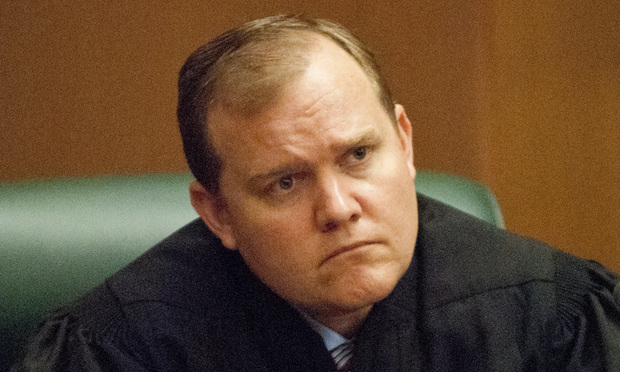Why the Court of Appeals Said No to Guns in the Garden
The law at the center of the decision permits those authorized to carry a weapon to do so “in every location in this state” not otherwise excluded by law—with an important exception for private property owners or those in legal control of property through a lease.
March 15, 2018 at 04:13 PM
4 minute read

On a day that students walked out across the country to demonstrate against the legal use of high-powered automatic rifles like the one used to kill 17 students and teachers at a Parkland, Florida, high school, the Georgia Court of Appeals took a stand against carrying guns.
The timing appeared to be coincidental. Still, the court turned down a gun rights group's challenge to the Atlanta Botanical Garden's no weapons policy.
Even in agreeing with a panel of three colleagues ruling against GeorgiaCarry.org in seeking to pack pistols into the garden, Chief Judge Stephen Dillard paid homage to the Second Amendment and called the losing argument “attractive.”
“The right of Americans to 'keep and bear arms' has 'justly been considered,
as the palladium of the liberties of a republic,'” Dillard wrote in the opening of his special and full concurrence. “And the private property rights we enjoy as free citizens are 'among the most basic of human rights.'”
Thus Dillard set up the heart of the dispute as the lawyers framed it: the right to bear arms v. the right to control private property. “The General Assembly sought to balance these sacrosanct rights in OCGA § 16-11-127 (c),” Dillard said.
The law at the center of the decision permits those authorized to carry a weapon to do so “in every location in this state” not otherwise excluded by law—with an important “provided, however.” The exception is for private property owners or those in legal control of property through a lease.
GeorgiaCarry.org based its challenge on the fact that the city of Atlanta owns the land where the Atlanta Botanical Garden sits in Piedmont Park. But the court determined that the garden's 50-year lease puts the private nonprofit organization in legal control of the property.
GeorgiaCarry.org was represented by Roswell attorney John Monroe, who said Thursday he will appeal.
“We respect the hard work the court did on the case, but we are nonetheless disappointed in the result,” Monroe said by email. “After careful consideration, we have decided to petition the Supreme Court of Georgia for certiorari.”
The garden was represented by Michael Brown, who was with Alston & Bird as he argued the case but is now a newly-confirmed judge on the U.S. District Court for the Northern District of Georgia. Brown could not be reached immediately.
“So, under the plain meaning of the statute's text, the Garden appears, at first blush, to be prohibited from excluding authorized individuals carrying weapons on its premises because it does not own and is not in legal control of private property,” Dillard said. “But having carefully considered the longstanding Supreme Court of Georgia precedent relied upon by the majority, I am persuaded that the reasoning contained in those decisions applies with equal force in this statutory context, and, therefore, the trial court's judgment should be affirmed.”
The panel affirmed Fulton County Superior Court Judge Gail Tusan's grant of summary judgment in favor of the garden on GeorgiaCarry.org's petition for declaratory and injunctive relief.
Writing for the majority, Judge Brian Rickman said, “The plain and unambiguous language of OCGA § 16-11-127 (c) grants persons in legal control of private property through a lease the right to exclude individuals carrying weapons, and well established authority from the Supreme Court of Georgia designates the land leased by the Garden as private property.”
Rickman relied heavily on a 1963 Supreme Court decision in Delta Air Lines Inc. v. Coleman, 219 Ga. 12 (131 SE2d 768). “Delta argued that it was exempt from paying ad valorem tax on the land because the land was public property,” Rickman said. “The Court disagreed, holding that, “[w]hen any estate in public property is disposed of, it loses its identity of being public property and is subject to taxes while in private ownership just as any other privately owned property.”
Dillard underscored the point in his concurrence, joined by the other member of the panel, Presiding Judge John Ellington. As Dillard put it, “Indeed, it would be a
curious thing to deny an entity leasing public property the benefit of the City's tax
exempt status while simultaneously requiring that lessee to permit gun owners on its property without consent.”
The case is GeorgiaCarry.org v. Atlanta Botanical Garden Inc., No. A17A1639.
This content has been archived. It is available through our partners, LexisNexis® and Bloomberg Law.
To view this content, please continue to their sites.
Not a Lexis Subscriber?
Subscribe Now
Not a Bloomberg Law Subscriber?
Subscribe Now
NOT FOR REPRINT
© 2025 ALM Global, LLC, All Rights Reserved. Request academic re-use from www.copyright.com. All other uses, submit a request to [email protected]. For more information visit Asset & Logo Licensing.
You Might Like
View All
Law Firms Expand Scope of Immigration Expertise Amid Blitz of Trump Orders
6 minute read
Bass Berry & Sims Relocates to Nashville Office Designed to Encourage Collaboration, Inclusion
4 minute read
Gunderson Dettmer Opens Atlanta Office With 3 Partners From Morris Manning
3 minute read
Trending Stories
- 1Uber Files RICO Suit Against Plaintiff-Side Firms Alleging Fraudulent Injury Claims
- 2The Law Firm Disrupted: Scrutinizing the Elephant More Than the Mouse
- 3Inherent Diminished Value Damages Unavailable to 3rd-Party Claimants, Court Says
- 4Pa. Defense Firm Sued by Client Over Ex-Eagles Player's $43.5M Med Mal Win
- 5Losses Mount at Morris Manning, but Departing Ex-Chair Stays Bullish About His Old Firm's Future
Who Got The Work
J. Brugh Lower of Gibbons has entered an appearance for industrial equipment supplier Devco Corporation in a pending trademark infringement lawsuit. The suit, accusing the defendant of selling knock-off Graco products, was filed Dec. 18 in New Jersey District Court by Rivkin Radler on behalf of Graco Inc. and Graco Minnesota. The case, assigned to U.S. District Judge Zahid N. Quraishi, is 3:24-cv-11294, Graco Inc. et al v. Devco Corporation.
Who Got The Work
Rebecca Maller-Stein and Kent A. Yalowitz of Arnold & Porter Kaye Scholer have entered their appearances for Hanaco Venture Capital and its executives, Lior Prosor and David Frankel, in a pending securities lawsuit. The action, filed on Dec. 24 in New York Southern District Court by Zell, Aron & Co. on behalf of Goldeneye Advisors, accuses the defendants of negligently and fraudulently managing the plaintiff's $1 million investment. The case, assigned to U.S. District Judge Vernon S. Broderick, is 1:24-cv-09918, Goldeneye Advisors, LLC v. Hanaco Venture Capital, Ltd. et al.
Who Got The Work
Attorneys from A&O Shearman has stepped in as defense counsel for Toronto-Dominion Bank and other defendants in a pending securities class action. The suit, filed Dec. 11 in New York Southern District Court by Bleichmar Fonti & Auld, accuses the defendants of concealing the bank's 'pervasive' deficiencies in regards to its compliance with the Bank Secrecy Act and the quality of its anti-money laundering controls. The case, assigned to U.S. District Judge Arun Subramanian, is 1:24-cv-09445, Gonzalez v. The Toronto-Dominion Bank et al.
Who Got The Work
Crown Castle International, a Pennsylvania company providing shared communications infrastructure, has turned to Luke D. Wolf of Gordon Rees Scully Mansukhani to fend off a pending breach-of-contract lawsuit. The court action, filed Nov. 25 in Michigan Eastern District Court by Hooper Hathaway PC on behalf of The Town Residences LLC, accuses Crown Castle of failing to transfer approximately $30,000 in utility payments from T-Mobile in breach of a roof-top lease and assignment agreement. The case, assigned to U.S. District Judge Susan K. Declercq, is 2:24-cv-13131, The Town Residences LLC v. T-Mobile US, Inc. et al.
Who Got The Work
Wilfred P. Coronato and Daniel M. Schwartz of McCarter & English have stepped in as defense counsel to Electrolux Home Products Inc. in a pending product liability lawsuit. The court action, filed Nov. 26 in New York Eastern District Court by Poulos Lopiccolo PC and Nagel Rice LLP on behalf of David Stern, alleges that the defendant's refrigerators’ drawers and shelving repeatedly break and fall apart within months after purchase. The case, assigned to U.S. District Judge Joan M. Azrack, is 2:24-cv-08204, Stern v. Electrolux Home Products, Inc.
Featured Firms
Law Offices of Gary Martin Hays & Associates, P.C.
(470) 294-1674
Law Offices of Mark E. Salomone
(857) 444-6468
Smith & Hassler
(713) 739-1250






